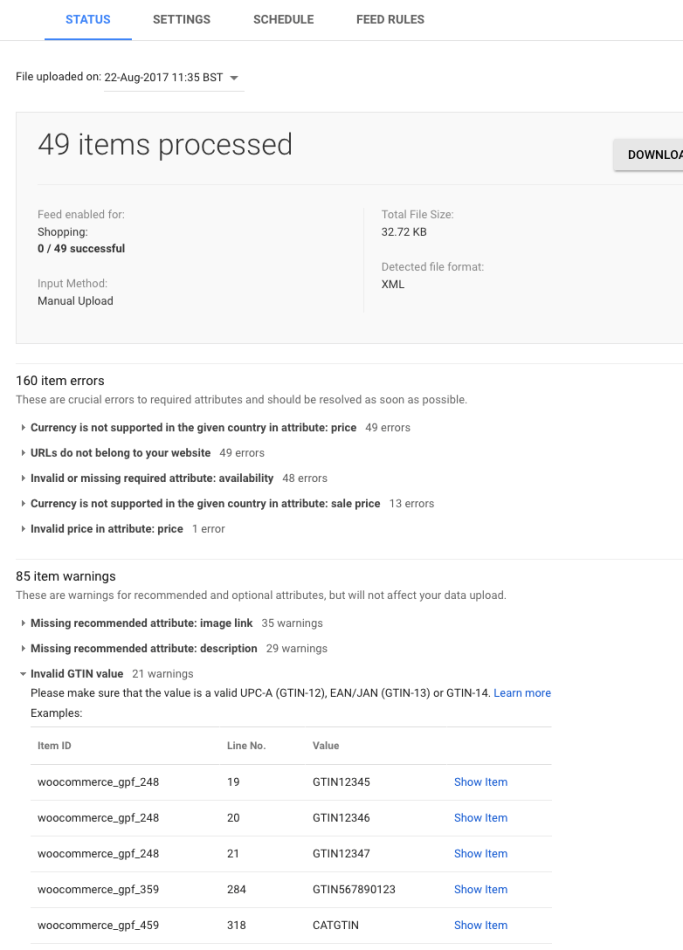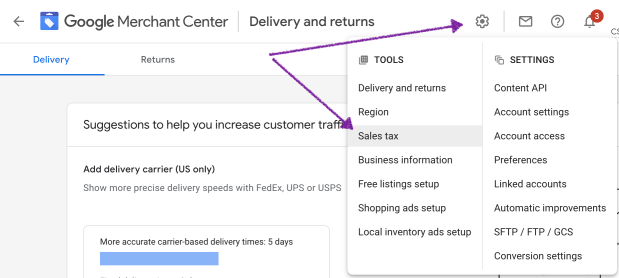If there are any issues with the feed file you uploaded, you can click on the feed name to get further details. A list of errors and warnings is provided, with a description of what is required to resolve the issue and examples of some items affected.

Generally resolving these will be a case of enabling a feed field, and providing data for it, or resolving data quality issues with the data being output. For information on setting up the values that go into the feed read the support article on Setting Product Data.
If you need to raise a support ticket about data issues from this page, then please be sure to include the full, exact error message, and at least one specific item ID that exhibits the error. The feed page includes a Download full report button which can be used to download a list of all errors / warnings.
My feed is missing tax
↑ Back to topTo account for tax on your products, configure tax rules in your Google Merchant Center account. You can find options in the Sales Tax menu item in the Tools menu in your Google Merchant Center Account:

My feed is missing shipping information
↑ Back to topShipping rules need to be configured in your Google Merchant Center account. Shipping configuration is accessed from the “Delivery & returns” link in the Tools menu of your Google Merchant Centre account.

The feed includes shipping weights for products if you need to set up weight-based pricing. It’s not practical to provide shipping information in the feed itself. The feed can also be configured to send delivery_label information (which can be mapped to shipping classes in WooCommerce) if that helps you set up more accurate shipping information.
Insufficient product identifiers: Missing two out of three attributes [GTIN, Brand, MPN]
↑ Back to topGoogle require you to submit product identifiers for certain classes of products. The plugin supports all of the elements you need, however which you use will depend on your store. You can enable any of the required fields (GTIN / Brand / MPN) on the plugin settings page (WooCommerce >Settings >Product Feeds) as well as setting defaults, or pre-population rules to pull in data from other fields (e.g. SKU). For more information on providing product data, see the article on Setting Product Data.
Google says my feed is missing “xxxxxx”
↑ Back to topVerify that you selected the fields needed for your region and market sector on the Settings page found at: WooCommerce >Settings >Product Feeds.
If you’re unsure what information to provide, read Google’s guidance at: Product Feeds Specification. Once you know which fields are missing, read the support article on Setting Product Data.
Timeouts / “Extra content at the end of the document” errors
↑ Back to topThis error indicates that a full feed couldn’t be generated. There are a couple of reasons for this, and before taking any action, we’d encourage you to check your PHP / web-server error logs to understand the exact problem. Our support team are happy to review errors if the issue isn’t obvious.
The most common cause is that you’re hitting a limit on your hosting setup. Generating the product feed means that WordPress must load all product data for every product in a single web request, and it often takes more resources than an average page load. The feed generator tries to be as efficient as possible, but depending on the size and complexity of your store, and your chosen hosting environment, it may hit limits, either time limits, or memory limits.
Problems from hitting server limits
If you are hitting server limits – whether memory / CPU, or time limits, there are a number of things you can do.
Our preferred option is to enable feed item caching. This will pre-generate feed output for individual products, taking care to regenerate them when product information changes so that Google always receive up-to-date product information, but without having to regenerate the whole feed when just one product changes,
Alternatively approaches are below, but these all have disadvantages compared to feed item caching (above):
- Speak with your web host and see if the limits can be increased
- Ask Google to fetch per-category feeds for individual, or groups of categories rather than the full store
- Submit partial / limited feeds to Google
Other problems
If your logs indicate an issue that isn’t related to memory/CPU/time limits, then please open a support ticket with details of the error and our support team will be happy to investigate.
Google says my feed is HTML and not the correct format
If you are hosted at WPEngine, they don’t allow Google to access URLs with query arguments. Instead use a permalink-style URL.
Instead of:
http://www.example.com/?woocommerce_gpf=google
you should use:
http://www.example.com/woocommerce_gpf/google
My sale prices aren’t showing
↑ Back to topSale prices are included in the feed automatically, and should feed through to Google Merchant Centre automatically.
However, Google Merchant Centre shows the “standard price” in most places, which can be confusing. However, if you view the details of an individual product in your Google Merchant Centre account you should be able to confirm that the sale price is present. Navigate to Products » All Products and click on a specific product. On the product detail screen scroll down to the “Final Attributes” section, and you should see your sale price listed:

Questions & Feedback
↑ Back to topHave a question before you buy? Please fill out this pre-sales form.
Already purchased and need some assistance? Open a support ticket via the Help Desk.